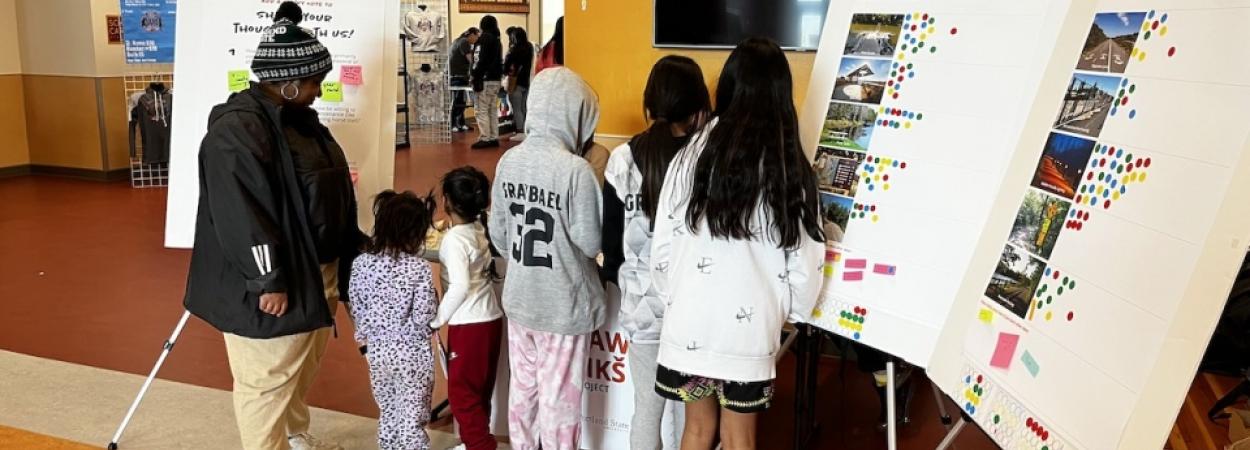As the 2023 Spring term wraps up at Portland State University (PSU), we're taking a moment to appreciate the work done by students finishing up their transportation engineering and planning programs. See below for a recap of some outstanding projects from graduating Master of Urban and Regional Planning (MURP) students in PSU's Toulan School of Urban Studies and Planning.
Master of Urban Planning (MURP) Workshop Projects
Nixyáawii Watikš
Team: Victoria Young, Jenny Mazzella, Nick Hadfield, Brian Liu, Sara Goldstein, Owen Christofferson
In this project, the student team partnered with the planning office of the Confederated Tribes of the Umatilla Indian Reservation to plan a multi-use trail to improve walkability and connectivity in the community. "We are consulting with the tribal government to build a multi-use path that would connect a neighborhood in the reservation called "Mission" where there is commercial activity as well as a government center, a health center, educational facilities and a neighborhood being planned. Our job is find the best alignment to connect it to the Pendleton Riverwalk to allow walking, biking, and equestrian use for the tribal community to be able to access, in a much more safe and comfortable manager, all the opportunities in the town of Pendleton as well as allow folks in Pendleton access to the reservation," team member Owen Christofferson said. Read East Oregonian coverage of the project: Portland State University students partner with tribes to plan trail.id=“gorge”
Gorge and Mount Hood Regional Park & Ride
Team: Emily D'Antonio, Aidan Simpson, Jessa Miller, Kadin Mangalik, Beth Whitener, and Harrison Husting
The purpose of this project is to develop a regional vision for park-and-ride facilities to increase and improve the park-and-ride system that serves the Columbia River Gorge and Mt. Hood region. The project focuses on the I-84, US 26, and OR 35 corridors, with a particular focus on underserved communities with limited access to the area. The intention of these park-and-rides is to be one of many strategies to improve access for people who work and play in the region. "The project hopes to start the conversation amongst community partners in regards to the regional vision for the transportation system and how park and rides fit into that vision. Through our part of the project we helped to bring these members together to understand the various wants and needs for park and rides. The next part of the project will be finalizing specific sites and having the collaboration necessary for those to be successful in solving the transportation challenges that face the area," said team member Emily D'Antonio. Learn more by visiting the project website: Gorge and Mt Hood Park and Ride Assessment.
Tree Canopy Development in the 82nd Avenue Corridor
Team: Amber Shackelford, Alvin Dimalanta, Caleb Susuras, Darby O’Brien, Eiji Toda
Community advocates and data analysis have confirmed that East Portland has significantly less tree coverage compared to other parts of the city. This lack of tree canopy negatively affects East Portland communities and contributes to the disproportionate impacts of urban heat island effects. The recent jurisdictional transfer of 82nd Avenue from the Oregon Department of Transportation to the City of Portland presents a unique opportunity for initiating change. This team's' central focus is to provide support to the revitalization efforts on 82nd Avenue through a tree canopy development strategy. The major stakeholders include property owners, business owners, the City, and all users who live, work and play along 82nd Avenue. "82nd Avenue has a huge potential for improvement in many aspects. We look forward to seeing the Corridor evolve and thrive with tree canopy as well as other infrastructural projects that contribute to members of the community equitably and sustainably," team member Eiji Toda said.
Fremont Bridgehead Reclamation
Team: Megan Grzybowski, Ananda Gordon-Peabody, Ian Meisner
Over the last 50 years, major public projects have caused the decline of the thriving Eliot neighborhood in North and Northeast Portland, within the former city of Albina. This MURP team developed strategies advocating for the Oregon Department of Transportation (ODOT) and the City of Portland to redevelop 25 acres of land east of the Fremont Bridge. The project proposed shortening the offramp, creating a new roundabout, and reconnecting the grid of local streets. In consultation with community members, the team came up with options for land in the area owned by ODOT and the Portland Bureau of Transportation (PBOT) to be reconfigured to improve local access for residents. One of the project's goals is the limit through traffic inside the new neighborhood, ensuring a safe and welcoming environment for residents to use their local streets. The project also proposed new walking and biking routes and improved access to transit.
Portland State University's Transportation Research and Education Center (TREC) is home to the U.S. DOT funded National Institute for Transportation and Communities (NITC), the Initiative for Bicycle and Pedestrian Innovation (IBPI), PORTAL, BikePed Portal and other transportation grants and programs. We produce impactful research and tools for transportation decision makers, expand the diversity and capacity of the workforce, and engage students and professionals through education and participation in research.




